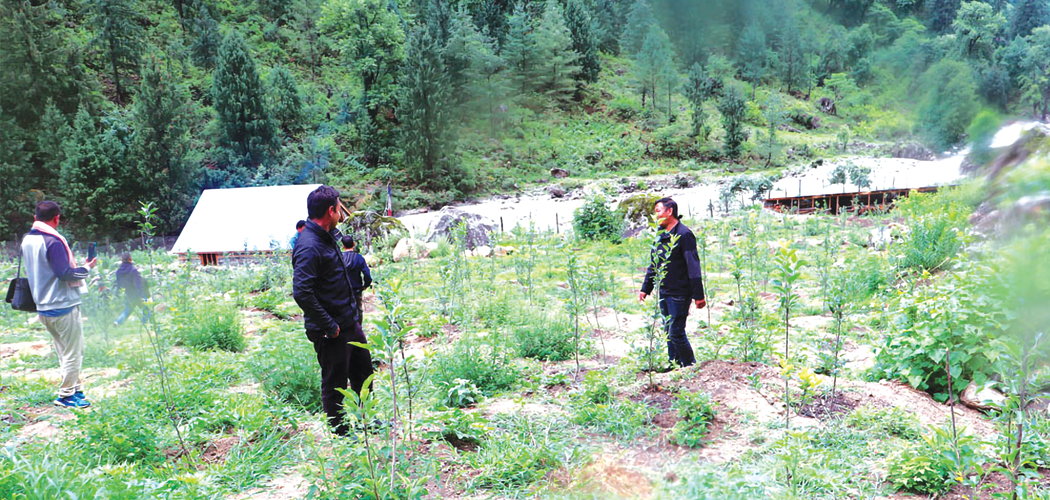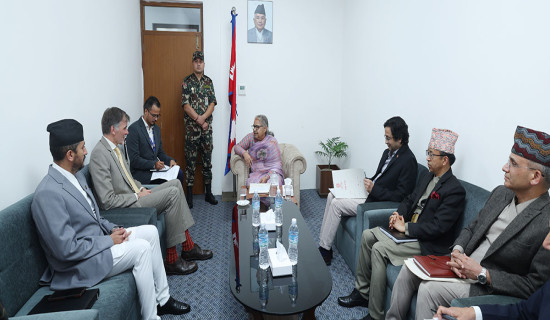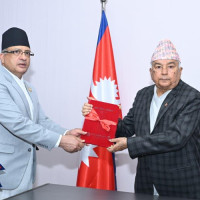- Thursday, 30 October 2025
Attracting Youths To Farming
Pramesh Pokharel
Though many of us are worried about the rural exodus, and migration of the country's most productive and active population impacting the development of the country and the future of agriculture; the neoliberal paradigm of corporate globalisation undermines the problem.
This paradigm justifies that human beings are mobile and have been migrating around the world for thousands of years. But the major causes of present migration are push factors and it is different from previous human migration that took place in different epochs in history. The present stage of neoliberal capitalism has triggered migration and its policies have devastating impacts on agriculture and rural lives and have pushed the youth away from agriculture.
Many progressive analysts claim that the recent migration and rural exodus results from rural distress, land grabbing, dislocation of indigenous and ethnic communities, agrarian crisis and many other impacts of neoliberal capitalism and corporate globalisation. So, people migrate due to many causes, but most of them at present are systemic push factors forcing people to leave their land and territories.
Social Movements such as People's Global Action and international peasant movements like La Via Campesina put forward the v iew that migration results from unequal development and rural-urban dichotomy.
It results from undermining agriculture, displacement and dislocation of indigenous people from their land and territories along with other problems created mainly by the capitalist system.
They also insist that with concrete actions, governments can address it. The alternative we seek is not the anti-globalisation perspective but a call for justice and equality, putting a robust alternative agenda of people's globalisation. In this context, the distraction of youths from agriculture should be addressed.
Causes of Migration
There may be individual, socio-cultural, politico-economic and natural causes of migration. But politico-economic factors are more prominent and infl uencing. As we live in the corporate globalised capitalist world, based on the profit cycle, exploitation of human resources or labour and natural resources are its primary sources for its existence.
The present form of the globalised neoliberal system, also called post-Fordism, needs labour reserves for its decentralised-multinational production and distribution system. Therefore, neoliberal reforms were directed to destroy the rural agricultural environment in developing countries where most people were engaged for their livelihood. Destruction of rural agriculture, uneven development, displacement of indigenous people and minorities from their land and territories, conflict etc., were the tools of capitalism to create labour reserves.
Neoliberal Reforms
Similarly, opening markets, destroying the cottage and small industries, grabbing land and natural resources, and cutting subsidies and grants in agriculture destroyed
rural agriculture resulting in agrarian distress and rural exodus. This is how corporate and financial capital has been successful to capture resources.
Though migration may be due to natural, humane and other causes, the unnatural migration we are experiencing is the result of neoliberal reforms of financial capital. In the context of so many challenges in agriculture degrading the agricultural environment and impacting rural lives, young people don't see prospects in agriculture. Rural villages, especially in developing countries, lack essential services and facilities to support dignified quality lives. That's why the young girls and boys have to migrate to find a school and then jobs.
Many families lack a piece of land to produce enough for their families around the year, whereas others are landless. Those with land titles also can't support their lives with rain-fed agriculture, sometimes destroyed by pests and other times by flood, landslides and drought. Even if we see the young generation as mobile and looking for choices, we have to agree that they do not have what they want in the rural areas of developing countries. Therefore, different factors that have forced youths to leave their families, societies, and territories have to be counted.
Another cause of youth migration and brain drain is the bourgeoisie educational model in developing countries. The social perception of education is based on capitalist values. So, despite getting undergraduate and graduate degrees, rural youths are either unemployed or waiting to migrate to other countries. The world system placed more importance on science and commerce and devaluated social science, prioritising values, ethics, and humanity. The emphasis on science and business studies without any plan to use the technical and professional human resources here in our own country is nothing but a means to produce the labour reserve for capitalism.

The devaluation of the agriculture sector, less priority for vocational science and polytechnics, and undermining of social science are apparent signs of the bourgeoisie education model resulting in the distraction of youth from agriculture and triggering brain drain.
There are many reasons the youth are not attracted to farming in Nepal. Agriculture is traditional and faces many historical, politico-economic and social challenges, starting from the access to resources, inputs, technology to the market and many more. Marginalisation and segregation of agriculture and peasantry have resulted in a bad image of farming. The agricultural reforms and programs favour the corporations and companies investing in agriculture, seeds and pesticides.
Agriculture is facing so many challenges that people do not see a future in farming. Agriculture in developing countries has become a much-neglected profession which used to be the best profession before the introduction of neoliberalism. Market monopoly, World Trade Regime and dumping of food items have degraded the agricultural environment. That's why farming families in a country like Nepal face severe challenges. How can this sector attract the young generation?
Conclusion
Therefore, Nepal should stop neoliberal reforms targeted at destroying the agricultural environment. The open border and free market are the biggest enemies of Nepalese peasants. The state should take some initiatives to protect agriculture and small-scale food producer. The land bank program, opening of foreign direct investment in agriculture and contract farming are recent neoliberal reforms which are going to have devastating impacts on agriculture.
It is vital to realise that food is life. Suppose the present trend continues with the growing population. In that case, there will be more need for food production, the ongoing price hike will continue, and the distribution pattern will be more unjust, affecting the food security of more people. Therefore, Let's think of future generations, humanity's future, and the balance of the ecosystem. The world development paradigm should prioritise the issue of food, its production and distribution in a sustainable way.
For this, attracting youth to agriculture and creating a conducive environment for farming in rural areas is urgent both to transform agriculture and for the future of agriculture.
We need to shift from neoliberal corporate agriculture to a sustainable way of producing enough food, practising family farming, small-scale agriculture and agro-ecology. Industrial agriculture and neoliberal reforms have displaced and dislocated the small farmers and impacted people's environment, social system, and health. Implementation of Food Sovereignty and guarantying of peasants' rights are key to addressing problems faced by agriculture and peasantry in Nepal.
(Pokharel is general secretary of All Nepal Peasants Federation)
















